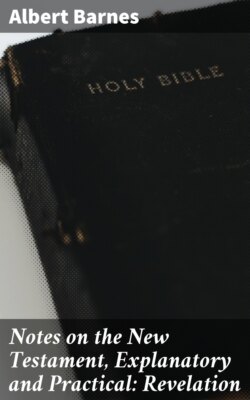Читать книгу Notes on the New Testament, Explanatory and Practical: Revelation - Albert 1798-1870 Barnes - Страница 7
На сайте Литреса книга снята с продажи.
Оглавление“But it is also affirmed, that the doctrinal views and sentiments inculcated in the Apocalypse are quite different from those found in the Gospel. This may be freely allowed without any detriment to their identity of authorship. How slow the Germans are in learning that a difference in the exhibition of truths substantially the same is far from being a contradiction! A difference of subject in connection with a different plan, demands correspondent dissimilarity of treatment. Besides, there must be a gradual development of the things pertaining to the kingdom of God on earth. Sensuous expectations of the Messiah, such as are alleged to abound in the Apocalypse, may be perfectly consistent with the spirituality of his reign, though it appears to us that the representations so designated are figurative, shadowing forth spiritual realities by means of outward objects.
“But what is to be said of the pneumatological, demonological, and angelogical doctrines of the book? The object for which John’s Gospel was primarily written did not lead the apostle to introduce so many particulars regarding angels and evil spirits. The intervention of good and the malignant influence of evil spirits are clearly implied in the Old Testament prophets, particularly in Zechariah and Daniel. It is therefore quite accordant with the prophetic Hebraistic character of the Apocalypse, to make angelic agency a prominent feature in the book. And that such agency is recognized in the Gospels, is apparent to the most cursory reader. The special object with which the fourth Gospel was written was different from that which prompted the composition of the Apocalypse, and therefore the subject-matter of both is exceedingly diverse. But still there is no opposition in doctrine. The same doctrinal views lie at the foundation of all the representations contained in them. In the one, the Redeemer is depicted in his humble career on earth; in the other, in his triumphs as a king—or rather, in the victorious progress of his truth in the world, notwithstanding all the efforts of Satan and wicked men to suppress it. As to a spirit of revenge in the Apocalyptic writer, it is not found. The inspired prophet was commissioned to pronounce woes and judgments as soon to befall the enemies of Christ, in consequence of their persevering, malignant efforts. As well might an evil disposition be attributed to the blessed Saviour himself, in consequence of his denunciation of the Scribes and Pharisees. The same John who wrote the Apocalypse says, in the Second Epistle, ver. 10, ‘If there come any unto you and bring not this doctrine, receive him not into your house, neither bid him God speed.’ It must ever strike the simple reader of the Apocalypse as a positive ground for attributing the authorship to John the apostle, that he styles himself THE servant of God by way of eminence, which none other at that time would have ventured to do; and that he employs the expression, I John, after the manner of Daniel, as if he were the only prophet and person of the name. Nor can it be well believed that a disciple of the apostle, or any other individual, should have presumed to introduce John as the speaker, thus deceiving the readers. The apostle was well known to the Christians of his time, and especially to the Asiatic churches. He did not therefore think it necessary to say John the Apostle for the sake of distinguishing himself from any other. See Züllig’s Die Offenbarung Johannis, Stuttgart, 1834, 8vo, p. 136.”
